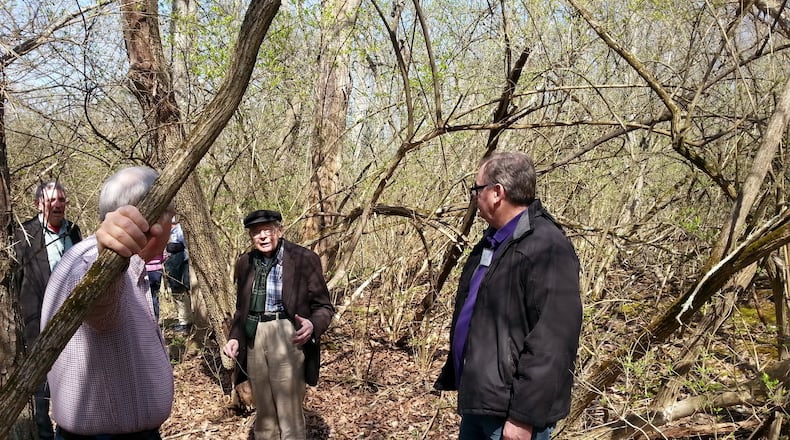The memorial service will begin at 12:30 p.m. and the trail dedication will follow immediately. A public reception will be held at the Oxford Community Art Center, 10 S College Ave., that afternoon from 3 to 5 p.m.
While the memorial and trail dedication are appropriate on Earth Day, the 47th anniversary of the first one, many area and national observances that day may, ironically, prevent some people from attending, who might otherwise want to do so.
MORE: Programs for all ages a priority for Oxford’s parks director
Orie Loucks was a longtime member of Hopedale Unitarian Universalist Community but had moved away. His career-long interest in ecology and conservation as well as his work for the Hopedale community led to naming the trail in his honor.
“He was very much involved with the church when they acquired the property and was involved with its development in all aspects. He was involved with the trail,” his son, Ted Loucks, said of the trail located on the church property. “The trail is in the woods behind where the church building sits. The congregation asked if they could host the memorial service and we said yes. He knew every inch of the property.”
Hopedale purchased this property in 1999 and Orie Loucks was active in Religious Education and taking care of the grounds with mowing, gardening and planting, according to his daughter, Kimberly Coplien, who added he frequently gave tours of the woods and the natural are to Sunday School students.
Orie Loucks attended the University of Toronto where he earned bachelor’s and master’s degrees in forestry. He earned his Ph.D. in Plant Ecology from the University of Wisconsin-Madison in 1960. After a seven-year stint with the Canada Department of Forestry, he joined the Botany Faculty at the University of Wisconsin in 1962 and achieved the rank of professor in 1967.
It was while working there he became involved in the first Earth Day observance.
“My dad was significantly involved with (U.S.) Senator Gaylord Nelson (of Wisconsin), who launched the first Earth Day, and worked on the first Earth Day. Dad was involved with that,” Ted Loucks said. “There was not another one for 20 years. The next one was 1990 and he was involved with that one. It took a while before the public made a big shift toward Earth Day.”
Download the free Journal-News app, Butler County’s #1 source for local news
Also while in Wisconsin, he was among a group of researchers who testified in 1969 about the harmful effects of DDT which led to the banning of DDT in Wisconsin and ultimately nationwide. He was also involved in negotiation of the 1972 and 1978 Great Lakes Water Quality Agreements and exposing destructive coal mining practices in the Appalachian Mountains.
He was active in the Ecological Society of America, which published a memorial in its January Bulletin. That memorial recalled Loucks’ recounting of the inspiration for that early ecological activism in Wisconsin.
“Orie recollected how Rachel Carson’s Silent Spring, published in 1962, had ‘resonated’ with him,” the bulletin article noted. “He became involved with a group of citizens and scientists concerned about the use of DDT. In 1969, this group, the Citizens Natural Resources Association of Wisconsin, convinced a judge to ban DDT from the state, three years before it was banned nationally. By that time, Orie and his associates had developed a model that showed how DDT accumulated in ecosystems. Under oath, he presented this model in court, the last person to testify before the plaintiffs’ attorneys rested their case (see Bill Berry’s book, Banning DDT: How Citizen Activists in Wisconsin Led the Way).”
The elder Loucks and his wife, Elinor, moved their family in 1978 to Butler University in Indianapolis where he became director of the Holcomb Research Institute in 1983. Then in 1989, he joined the faculty of Miami University where he held the Ohio Eminent Scholar Chair in Applied Ecological Studies until his retirement in 2002.
He remained active in ecology and conservation efforts, supporting many charitable causes but his favorites included The Nature Conservancy, the International Crane Foundation and Hopedale Unitarian Universalist Community. A Memorial Fund in his honor was established with The Nature Conservancy for maintenance and preservation of the Spring Green Preserve, a prairie he worked to conserve since the early 1970s.
Orie and Elinor Loucks moved to Waunakee Wisconsin in January 2015 after 25 years in Oxford where he was also involved with the Three Valley Conservation Trust and the institute for Learning in Retirement.
He died with his family by his side at home as a result of Multiple Myeloma cancer. In addition to his wife of 60 years, he is survived by his three children and their spouses Eric (Mary), Kimberly (Michael) Coplien and Edward (Tina); grandchildren William and Emily Loucks and Lucy Robbins; brother Foster (Dianne) and sister-in-law Susan and 15 nieces and nephews and their many children.
About the Author
